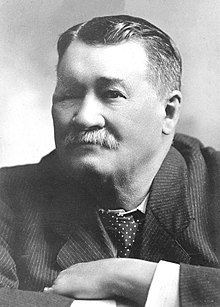The Honourable Leverett George DeVeber | |
|---|---|
 | |
| Member of the Senate of Canada | |
| In office March 8, 1906 – July 9, 1925 Serving with James Lougheed (1906–1925) William Harmer (1918–1925) Edward Michener (1918–1925) William Antrobus Griesbach (1921–1925) Jean Côté (1923–1924) Amédée E. Forget (1911–1923) Peter Talbot (1906–1919) Philippe Roy (1906–1911) | |
| Prime Minister | Wilfrid Laurier |
| Constituency | Alberta |
| Member of the Legislative Assembly of Alberta | |
| In office November 9, 1905 – March 7, 1906 | |
| Preceded by | New district |
| Succeeded by | William Simmons |
| Constituency | Lethbridge |
| Minister without portfolio in the Government of Alberta | |
| In office September 1, 1905 – March 1, 1906 | |
| Member of the Legislative Assembly of the Northwest Territories | |
| In office November 4, 1898 – January 1, 1905 | |
| Preceded by | Charles Alexander Magrath |
| Succeeded by | District abolished |
| Constituency | Lethbridge |
| Personal details | |
| Born | February 10, 1849 Saint John, New Brunswick |
| Died | July 9, 1925 (aged 76) Aylmer, Quebec |
| Political party | Alberta Liberal Party Liberal Party of Canada |
| Spouse | Rachael Ann Ryan |
| Children | Marion Frances DeVeber Leverett Sandys DeVeber |
| Residence(s) | Lethbridge, Alberta |
| Alma mater | University of Pennsylvania |
| Occupation | Medical doctor |
Leverett George DeVeber (sometimes spelled De Veber[1][2]) (February 10, 1849 – July 9, 1925) was a Canadian politician who served as Member of the Legislative Assemblies of Alberta and the North-West Territories, minister in the government of Alberta, and member of the Senate of Canada. Born in New Brunswick and trained as a physician, he joined the North-West Mounted Police and came west, eventually settling in Lethbridge after leaving the police force. He represented Lethbridge in the North-West Legislative Assembly from 1898 until 1905, when Lethbridge became part of the new province of Alberta. He was appointed Minister without Portfolio in Alberta's first government, but resigned four months later to accept an appointment to the Senate, where he remained until his death.